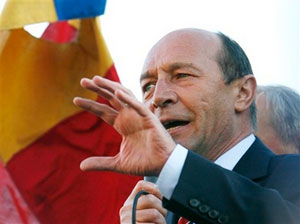April 25, 2007 (the date of publication in Russian)
Alexei Chichkin
HE WENT TOO FAR
Romania's President stumbles over his own geopolitical improvisations
 The chair of Romania's President Traian Băsescu shook after Prime Minister Călin Popescu-Tăriceanu, chair of National Liberal Party (PNL), decided to expel of the ministers, represented by Băsescu's Democratic Party, from the government. Subsequently, the parliament built up a new coalition, including liberals and – for the first time in Romania's history – also representatives of the Democratic Alliance of Hungarians in Romania (UDMR). Then, the Parliament initiated the impeachment of the President, who was accused of power abuse, totalitarian ambitions, and betrayal of Romania's national interests. Though the Constitutional Court recognized those charges as politically biased and legally insufficient for impeachment, both the liberal and Hungarian opposition is committed to force Băsescu to resign.
The chair of Romania's President Traian Băsescu shook after Prime Minister Călin Popescu-Tăriceanu, chair of National Liberal Party (PNL), decided to expel of the ministers, represented by Băsescu's Democratic Party, from the government. Subsequently, the parliament built up a new coalition, including liberals and – for the first time in Romania's history – also representatives of the Democratic Alliance of Hungarians in Romania (UDMR). Then, the Parliament initiated the impeachment of the President, who was accused of power abuse, totalitarian ambitions, and betrayal of Romania's national interests. Though the Constitutional Court recognized those charges as politically biased and legally insufficient for impeachment, both the liberal and Hungarian opposition is committed to force Băsescu to resign.
The culmination of the domestic political crisis in Romania, culminating in the impeachment initiative, coincided with serious political tensions between Bucharest and Budapest, with the constitutional crisis in Ukraine – and with the start of construction of the Constança-Pecs-Zagreb-Triest oil pipeline, essentially designed as an alternative to the Russia-promoted Burgas-Alexandrupolis pipeline project. The Constança-Triest pipeline is financed both from the United States and the European Union.
Realizing the key role of his country in the efforts to establish a Russia-circumventing energy link, Traian Băsescu exceeded the unwritten rules of political behavior within the EU. Romanian media admit that a powerful faction of the Brussels nomenclature is dissatisfied with Băsescu's attempts to elevate Romania's role in the European Community by establishment a dissident "East European bloc" inside EU.
During the recent talks with representatives of the European Commission in Bucharest, Băsescu proposed to transform the present EU into a loose confederation with two headquarters – one in Brussels, and another in Bucharest, with reference to the historical Minor Entente of 1920-1930s. That was surprising for the EU establishment, which believed that Romania should be grateful to Brussels for the very fact of admission of Romania in the EU. Meanwhile, Băsescu's idea to transform the Black Sea Association of Economic Cooperation into a military bloc raised eyebrows already in the headquarters of NATO.
The European Union has already encountered a similar affront from Poland, with its permanent efforts to gain a higher status in the Community. In its turn, the United States was interested in both Polish and Romanian ambitions as a lever of pressure upon the "old Europe", as well as Russia, by deployments of strategic military facilities in these countries, as well as Czechia and Bulgaria. Băsescu eagerly displayed his readiness to serve to Washington's geopolitical designs, even proposing to construct a new Washington-London-Bucharest axis. The target of this "spear" was also clearly identified: Băsescu complained that Russia "regards the Black Sea as a Russian lake".
At his press conference in Budapest, US Ambassador Nicholas Taubman informed mass media that already in the end of April, a US contingent is going to be deployed at the Michal Kogalniceanu military base near Constança. In accordance with the agreement, signed in late 2005 by Traian Băsescu and US Secretary of State Condoleezza Rice, the US troops may use five military objects in Romania. There were even rumors that in case of a serious destabilization in Ukraine, a US contingent may be deployed on Zmeyiny Isle in the mouth of the Danube, conveyed to Ukraine in the framework of post-WWII accords, but disputed by Romania. It is noteworthy that these deployments are envisaged by the United States alone and not in the framework of NATO, which includes major EU nations.
However, Washington was dissatisfied with a number of Băsescu's ambitious initiatives. In particular, Washington was annoyed with Romania's claims for a part of Ukraine's territory which Băsescu tried to push through Kishinev. In particular, Basescu urged the leadership of Moldova to declare its claims for the present Bukovina (Chernovtsy Region of Ukraine) and the Danube-Black Sea territory of Eastern Bessarabia, which includes a number of river ports and military facilities of Ukraine's Odessa region: Ackerman (Belgorod-Dnestrovsky), Izmail, Reni, Vilkovo, Kiliya. Another romantic plan, suggesting annexation of a part of the historical Dobruja from Bulgaria, could be used for pressure upon Sophia over the Burgas-Alexandrupolis pipeline. Still, Bulgaria's decision to join Russia's oil and gas pipeline projects suggested that this effort resulted in the opposite.
More dissatisfaction with Basescu's political behavior was aroused by his opposition to Martti Ahtisaari's plan of Kosovo independence under international patronage. Băsescu's decision to join the governments of Slovakia and Greece in this affront did not correspond with the US plans to create one more permanent lever of geopolitical pressure on the EU. Băsescu's behavior, motivated with fears of Hungarian separatism within his nation (similar concerns expressed by governments of Slovakia and Serbia, while Greece faces its own problem of ethnic Albanian separatism), was not understood by the strategists of the "new European disorder".
Romania's unique geographic position forced major world powers to tolerate domestic and foreign political voluntarism, displayed by Romanian leaders, including NicolaeCeauşescu. Still, today's design of a unipolar world suggests obedience in all the aspects of foreign policy, while excessive initiatives are not greeted.
Number of shows: 1065
 ENG
ENG 

 ENG
ENG 
